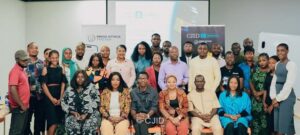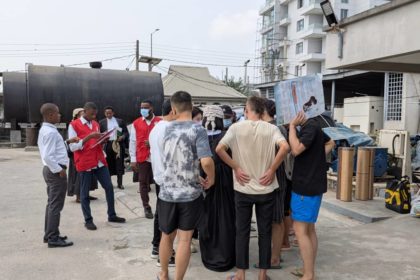
By Adeyemi Adekunle
For years, Nigerian journalists have faced a growing wave of frivolous lawsuits designed to silence critical reporting and intimidate media organizations. These Strategic Lawsuits Against Public Participation (SLAPPs) have become a major threat to press freedom, forcing journalists into lengthy legal battles that drain resources and stifle investigative reporting.
The legal system, rather than being a shield for justice, is increasingly being manipulated by the powerful to muzzle the press, creating an environment where journalists are not only afraid to speak but also financially incapacitated to defend themselves in court. This misuse of litigation threatens the very foundation of investigative journalism and accountability reporting, which are essential to a functioning democracy.
To address this challenge, leading media professionals, civil society organizations, and press freedom advocates gathered at a workshop organized by the Centre for Journalism Innovation and Development (CJID) in partnership with UNESCO’s Global Media Defence Fund (GMDF) on Monday February 24, 2025. The event, tagged “Navigating Legal Challenges: Laws that Criminalize Journalism and Strategic Lawsuits Against Public Participation (SLAPP) in Newsrooms,” brought together key stakeholders from the media and legal communities to discuss the increasing use of SLAPP suits against journalists, their far-reaching consequences, and possible strategies for countering this form of legal harassment.
The gathering marked an important moment in the fight against press suppression, as media practitioners collectively resolved to push back against these legal onslaughts and defend their right to report freely.
Speaking at the event, Dayo Aiyetan, Executive Director of the International Centre for Investigative Reporting (ICIR), described SLAPPs as a deliberate strategy used by powerful individuals and institutions to suppress journalism.
These lawsuits, he explained, are not necessarily intended to win in court but to wear down journalists through lengthy and expensive legal battles. He highlighted that the goal of SLAPPs is to discourage investigative reporting by making it financially unsustainable for media houses to continue their work.
“These lawsuits are not about justice; they are designed to suppress, intimidate, and waste journalists’ time,” Aiyetan said. “Most media houses in Nigeria lack the financial capacity to fight prolonged court cases, making them vulnerable to legal intimidation.”
He recounted several cases where ICIR and other media houses had been sued simply for exposing corruption and misconduct. Aiyetan warned that unless journalists and media organizations built strong legal defense mechanisms, investigative journalism in Nigeria would continue to suffer.
He pointed to the need for solidarity within the media industry, arguing that collective action was the best defence against legal intimidation. The gathering was a critical moment to reinforce the importance of press freedom and identify concrete ways to resist SLAPPs.
Musikilu Mojeed, Editor-in-Chief of Premium Times and President of the International Press Institute, noted that while legal action is sometimes necessary to protect reputations, the increasing abuse of lawsuits against the media is deeply troubling. He emphasized that the absence of consequences for those who initiate baseless lawsuits has emboldened individuals and entities to use the legal system as a weapon against journalists.
“In Nigeria, there are no consequences for those who file frivolous lawsuits,” Mojeed explained. “If you have money and power, you can take a journalist to court simply because you don’t like what they wrote about you. Even if you know you won’t win, the goal is to drag the journalist through a difficult and expensive legal battle.”
He revealed that Premium Times and other media organizations had spent millions of naira defending themselves against such lawsuits. The costs of litigation, he noted, are not only financial but also psychological, as journalists and their organizations are forced to divert attention and resources away from their core mandate—holding power to account. Mojeed called for better industry coordination to track and document these cases to expose how the legal system is being used against journalists. He advocated for legal reforms to deter frivolous lawsuits and protect press freedom.
Beyond the financial burden, media professionals at the workshop also raised concerns about judicial corruption and bias against the press. Idris Akinbajo, Managing Editor of Premium Time, highlighted how some judges show open hostility toward journalists, making fair rulings difficult to obtain. He recounted specific cases where media organizations had strong evidence in their favor, yet faced unfavorable judgments due to external influences.
“When a journalist is sued by a wealthy politician or business mogul, the legal scales often tilt in favor of the accuser,” he said. “Some judges have deep biases against the media, making it harder for journalists to get a fair trial.”
Akinbajo warned that many media organizations now self-censor, fearing expensive legal battles. “Journalists are being forced to think twice before publishing investigative reports, not because the stories are false, but because they know they could face years in court,” he said.
He added that legal intimidation is not just about individual cases but a broader attempt to weaken investigative journalism across the country. This, he argued, has dangerous implications for democracy, as it allows corruption and abuse of power to thrive unchecked.
To help journalists recognize and respond to SLAPPs, Mojirayo Ogunlana, Executive Director of Digicivic Initiative, provided a detailed breakdown of how these lawsuits function. She explained that SLAPP suits typically involve exaggerated claims of defamation, excessive damages, and prolonged legal battles meant to exhaust journalists financially and mentally. “The first step in fighting SLAPP suits is recognizing them for what they are—a tool for intimidation,” Ogunlana said. She urged journalists to be proactive in seeking legal advice before publication, as preventive measures could reduce their vulnerability to lawsuits.
She also emphasized the importance of collective action, stating that journalists must work together rather than face these legal battles alone. By building alliances with media rights organizations, civil society groups, and legal professionals, she argued, journalists could create stronger defenses against SLAPPs. Ogunlana also called for the establishment of a legal defence fund dedicated to supporting journalists facing frivolous lawsuits, ensuring that financial constraints do not become a reason for abandoning important investigative stories.
During the workshop, Busola Ajibola, Deputy Director CJID presented findings from CJID’s report, Hidden Battles: Patterns and Nuances of Violence Against Female Journalists in Nigeria, which examined how female journalists face unique threats in addition to SLAPP suits. She pointed out that gender-based violence in the media industry is often overlooked but remains a pressing issue. “In addition to legal harassment, female journalists are more likely to face online abuse, threats of physical violence, and workplace discrimination,” Ajibola explained.
She stressed that many female journalists hesitate to report legal threats due to fear of further victimization. “We must create stronger support systems for women in journalism,” she urged. Her presentation underscored the need for gender-sensitive policies in press freedom advocacy and the importance of ensuring that female journalists have the necessary legal and institutional backing to withstand threats and harassment.
Adebayo Aare, Project Associate for CJID’s Media Freedom Project, introduced the Press Attack Tracker a tool designed to document and report press freedom violations. “By systematically tracking these cases, we can build stronger advocacy efforts and push for policy reforms that protect journalists,” Aare said. He encouraged media practitioners to use the platform to document instances of legal intimidation.Tracking SLAPP suits and other press freedom violations, he argued, would provide critical data to support legal and policy advocacy.
In her closing remarks, CJID’s Media Freedom Project Officer, Christiana Alonge, reiterated the organization’s commitment to supporting journalists under legal threat. She highlighted ongoing efforts to develop resources that would help journalists navigate legal challenges, including legal advisory services and training programs on press law. “We are creating multiple channels to provide journalists with legal resources and tools to ensure their safety,” Alonge said. Speaking to Lens AfricaTV, she emphasized that special attention was being given to female journalists facing various forms of threats. “The program is also being crafted to create a safe space for women in journalism,” she noted.
The workshop underscored the urgent need for stronger protections against frivolous lawsuits and other legal threats to press freedom. To counter these challenges, media professionals, civil society organizations, and press freedom advocates must work collectively to strengthen legal support, push for policy reforms, and foster greater industry solidarity. The formation of a united front against SLAPPs signals a renewed commitment to protecting press freedom and ensuring that the truth is not buried under the weight of legal intimidation.




